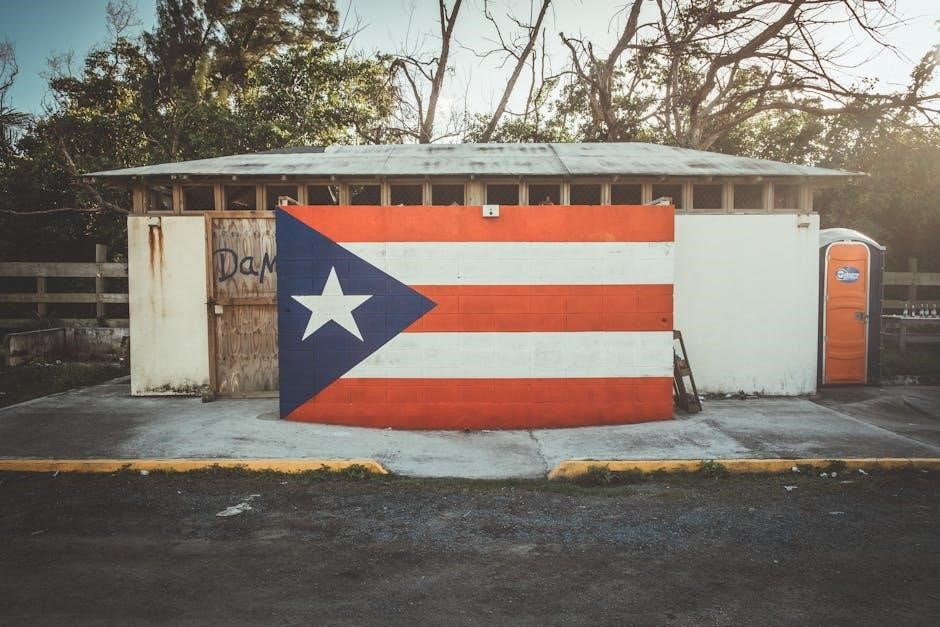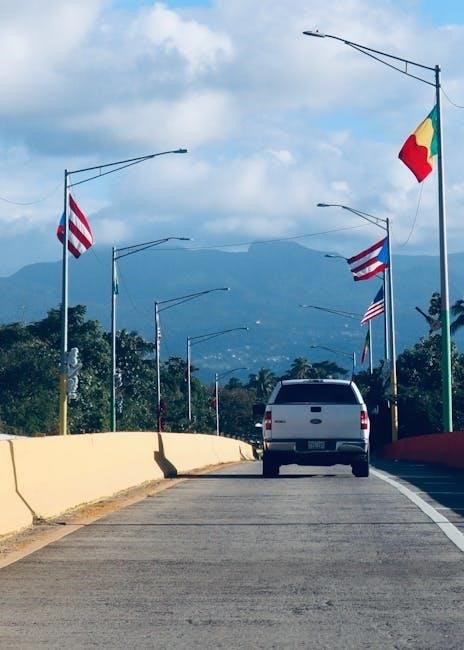
when i was a puerto rican pdf
When I Was Puerto Rican by Esmeralda Santiago is a powerful memoir exploring her childhood, cultural identity, and the transition from Puerto Rico to New York City.
Overview of the Book
When I Was Puerto Rican by Esmeralda Santiago is a semi-autobiographical memoir that vividly captures her childhood in rural Puerto Rico during the 1950s and her eventual migration to New York City. The book explores themes of cultural identity, family dynamics, and the challenges of adapting to a new environment. Through lyrical prose, Santiago recounts her early life, offering a poignant reflection on belonging and self-discovery. It is the first in a trilogy of memoirs, setting the stage for her journey of growth and resilience.
Significance of the Title
The title When I Was Puerto Rican reflects the author’s deep connection to her Puerto Rican heritage and identity. It captures a specific period of her life, emphasizing her roots and the cultural essence she carried with her. The title also hints at the transition she undergoes, as she navigates between two worlds—Puerto Rico and the United States. It symbolizes the essence of her journey, blending nostalgia with the complexities of cultural adaptation and self-discovery.
Author Background
Esmeralda Santiago is a renowned Puerto Rican author, known for her vivid storytelling and cultural insights. Her works include memoirs and novels, capturing her heritage and experiences.
Esmeralda Santiago’s Early Life
Esmeralda Santiago was born in Puerto Rico, where she experienced a childhood marked by frequent moves between rural and urban areas. Her family, led by her parents, faced economic challenges and limited education. Despite these hardships, Santiago’s early life was rich in cultural traditions and storytelling. Her parents’ dynamic relationship and the influence of her siblings shaped her perspective. At a young age, Santiago took on responsibilities, fostering resilience. Her formative years in Puerto Rico laid the foundation for her journey of self-discovery and cultural exploration.
Plot Summary
When I Was Puerto Rican recounts Esmeralda Santiago’s childhood in Puerto Rico, her family’s economic struggles, and their eventual move to New York City, exploring cultural shifts.
Childhood in Puerto Rico
Esmeralda Santiago’s memoir vividly portrays her childhood in rural Puerto Rico during the 1950s. Growing up in a poor but vibrant community, she experiences the richness of Puerto Rican culture. Her early years are marked by a close-knit family and the challenges of limited resources. The memoir captures the simplicity and beauty of life in a rural setting, where traditions and family values are central. This period shapes her identity and cultural heritage deeply.
Transition to New York City
Esmeralda Santiago’s memoir vividly captures her family’s move from Puerto Rico to New York City, a journey marked by cultural dislocation. The transition brings shock and confusion as she navigates a new language and societal norms. In Brooklyn, she faces the challenges of urban life, struggling to adapt while holding onto her Puerto Rican identity. This pivotal shift reshapes her sense of belonging and identity, highlighting the struggles of migration and cultural adjustment in a foreign environment.
Themes
Identity, cultural heritage, and socioeconomic challenges are central themes, reflecting Esmeralda’s journey of self-discovery and the struggles of navigating two worlds, blending personal and collective experiences seamlessly.
Identity and Belonging
Esmeralda Santiago’s memoir delves into her struggle with identity and belonging, navigating between her Puerto Rican roots and her new life in New York; The cultural shift forces her to reconcile her sense of self, balancing pride in her heritage with the pressures of assimilation. Her journey reflects the universal challenge of finding one’s place in a world where cultural boundaries often blur and collide, shaping her understanding of home and identity.
Cultural Heritage
Esmeralda Santiago’s memoir vividly portrays her deep connection to Puerto Rican traditions, language, and family values. Her childhood in a rural community is rich with cultural practices that define her sense of identity. The memoir highlights the importance of preserving heritage while adapting to a new environment, showcasing how her roots influence her resilience and perspective. Through her experiences, Santiago illustrates the vibrant tapestry of Puerto Rican culture and its enduring impact on her life.
Socioeconomic Challenges
Esmeralda Santiago’s memoir highlights the socioeconomic struggles faced by her family, including limited financial resources and her parents’ lack of formal education. The frequent moves between rural Puerto Rico and urban areas exacerbated these challenges, creating instability for the growing family. Her experiences reflect the broader economic difficulties faced by many Puerto Ricans during the 1950s, as well as the disparities encountered upon moving to New York City. These struggles shaped her perspective and resilience, underscoring the harsh realities of poverty and migration.

Cultural Significance
When I Was Puerto Rican holds deep cultural significance as it authentically represents the Puerto Rican experience, bridging identity, heritage, and migration, resonating widely in Latinx literature.
Representation of Puerto Rican Experience
When I Was Puerto Rican vividly captures the complexities of growing up in Puerto Rico during the 1950s, offering a personal yet universal narrative of cultural identity and migration.

Personal Growth
Esmeralda’s memoir recounts her journey of self-discovery, navigating cultural shifts and adapting to new environments, shaping her identity and resilience amid life’s challenges.
Esmeralda’s Journey of Self-Discovery
Esmeralda Santiago’s memoir vividly captures her journey of self-discovery, from her childhood in rural Puerto Rico to her transition to New York City. Her experiences reflect resilience as she navigates cultural shifts, language barriers, and socioeconomic challenges. The memoir highlights her growth from a curious child to a determined individual, embracing her identity while adapting to new environments. Through her story, Santiago illustrates the complexities of migration and the enduring strength of cultural heritage in shaping one’s sense of self;

Language and Identity
When I Was Puerto Rican explores the intersection of language and identity, highlighting how Esmeralda’s transition from Spanish to English shapes her cultural and personal sense of self;
Impact of Bilingualism
Esmeralda Santiago’s memoir vividly portrays the dualities of bilingualism, as she navigates Spanish and English. Language becomes a bridge between her Puerto Rican heritage and American life, shaping her identity. The transition from Spanish to English symbolizes her cultural shift, reflecting the broader experiences of many immigrants. Bilingualism not only influences her communication but also her sense of belonging, as she straddles two linguistic and cultural worlds. This duality is central to her journey of self-discovery and adaptation in a new environment.

Family Dynamics
Esmeralda’s memoir highlights her parents’ struggles with poverty and relocation, shaping her childhood. Their complex relationship and frequent moves deeply influenced her early life and identity formation.
Parental Influences and Migration Effects
Esmeralda’s mother played a pivotal role in her early life, navigating poverty and relocation. The family’s frequent moves between rural Puerto Rico and urban areas reflected her parents’ struggles to provide. Migration to New York City exposed Esmeralda to a starkly different culture, challenging her sense of identity. Her parents’ resilience and sacrifices shaped her resilience, while the abrupt shift in environments forced her to adapt and redefine her sense of belonging in a new, unfamiliar world.
Historical Context
The U.S. invasion of Puerto Rico in 1898 led to its colonization, shaping the island’s political climate in the 1950s and sparking debates over imperialism and identity.
Puerto Rico’s Political Climate in the 1950s
The 1950s marked a period of political tension in Puerto Rico, shaped by its status as a U.S. colony after the 1898 invasion. Debates over imperialism and identity intensified, with many Puerto Ricans questioning U.S. control. This era saw struggles for sovereignty and cultural preservation, influencing the daily lives of residents. The political climate reflected broader societal shifts, as Puerto Rico navigated its complex relationship with the United States, impacting Esmeralda Santiago’s formative years and the island’s collective identity.

Move to the US
Esmeralda Santiago’s family relocated from Puerto Rico to New York City, facing cultural and social adjustments. The move marked a significant shift in her life, challenging her identity and adaptation to a new environment.
Cultural and Social Adjustments
Esmeralda Santiago faced profound cultural and social adjustments upon moving to New York City. The transition from rural Puerto Rico to urban America was daunting, with language barriers and societal expectations contrasting sharply with her familiar island life. Adapting to a new culture required learning English and navigating unfamiliar customs, which often clashed with her Puerto Rican heritage. The move reshaped her identity, as she struggled to reconcile her roots with her new surroundings, highlighting the challenges of migration and cultural assimilation.
Reception
When I Was Puerto Rican received critical acclaim for its vivid storytelling and emotional depth, resonating with readers and critics alike as a poignant reflection of cultural identity and resilience.
_critical Acclaim and Reader Response
Critical Acclaim and Reader Response
When I Was Puerto Rican has garnered widespread critical acclaim for its lyrical prose and heartfelt narrative. Readers praised Santiago’s ability to capture the essence of cultural identity and childhood memories. The memoir resonated deeply with many, particularly within the Latinx community, for its authentic portrayal of migration and resilience. Critics celebrated its emotional depth and vivid storytelling, solidifying its place as a significant work in contemporary literature.
Legacy
When I Was Puerto Rican has left a lasting impact on Latinx literature, inspiring future writers to share their stories and celebrate their cultural heritage with authenticity.
Impact on Latinx Literature
When I Was Puerto Rican has significantly influenced Latinx literature, offering a poignant and authentic voice to the experiences of Puerto Rican identity and migration. Its lyrical prose and raw honesty have inspired countless writers to explore their own cultural narratives. By breaking stereotypes and shedding light on the complexities of cultural identity, Santiago’s work has become a cornerstone of Latinx literary tradition, fostering a deeper understanding and appreciation of diverse experiences.
When I Was Puerto Rican is a transformative memoir that captures Esmeralda Santiago’s journey of self-discovery and cultural identity. By sharing her experiences of childhood in Puerto Rico and migration to New York, Santiago offers a deeply personal yet universally relatable story. The book’s vivid storytelling and emotional depth have left a lasting impact on readers, making it a cherished work in Latinx literature. Its legacy continues to inspire, resonating with themes of identity, belonging, and resilience.
Related Posts

acls exam version c answers pdf
Get ACLS Exam Version C answers in PDF format. Free study guide, practice questions, and instant download. Prepare smarter, not harder!

explaining adhd to a child pdf
Learn how to explain ADHD to children in a simple, engaging way. Download our free PDF guide to help kids understand and manage their ADHD.

john paul jackson books pdf free download
Access John Paul Jackson’s books for free in PDF. Instantly download his spiritual teachings and revelations.